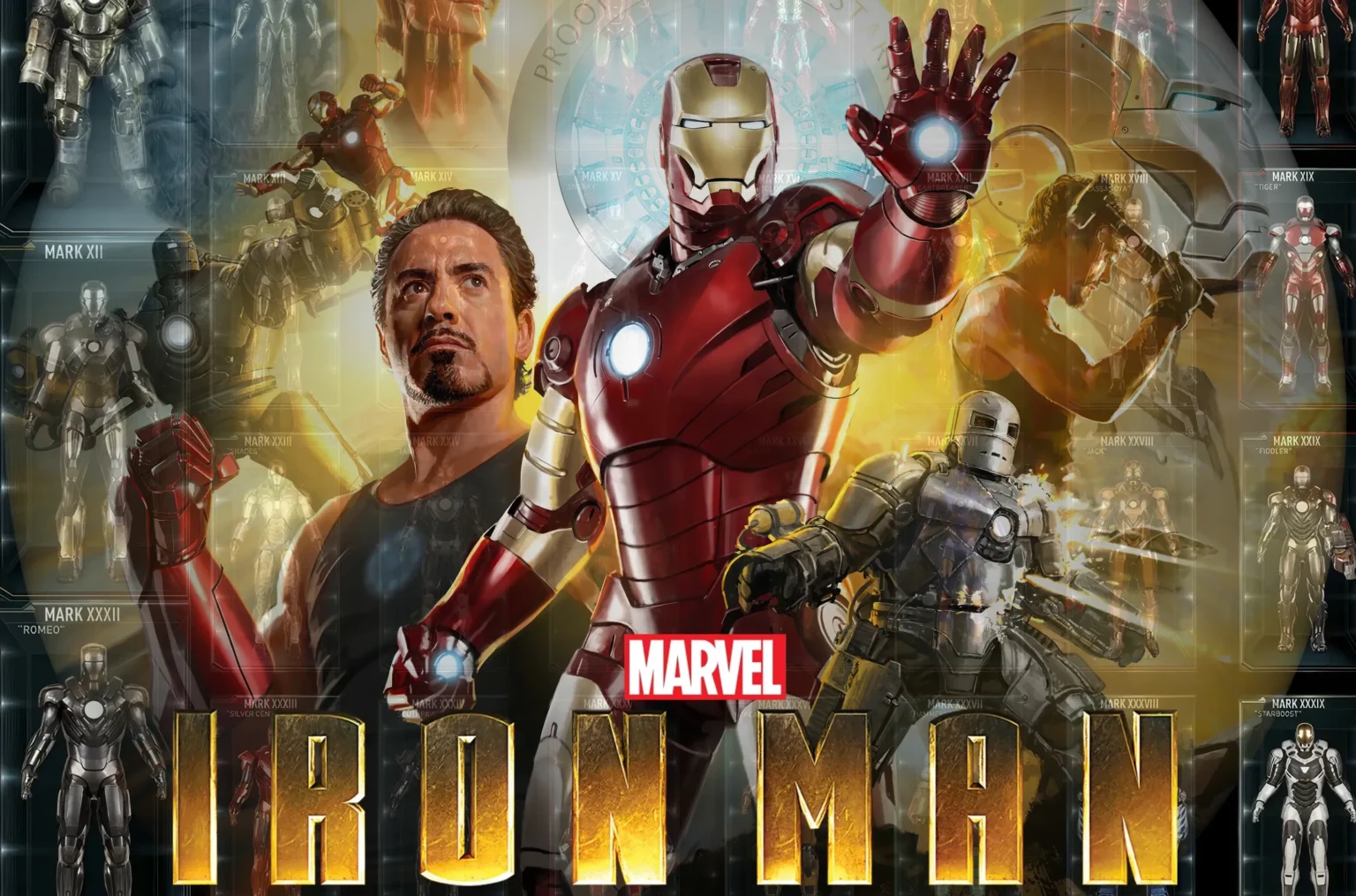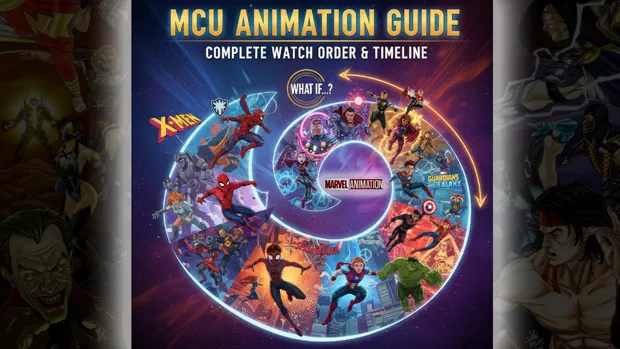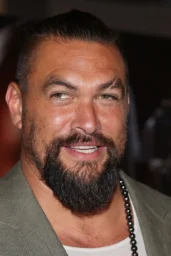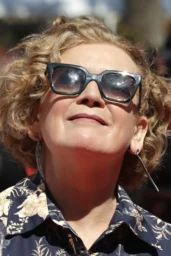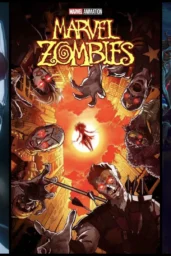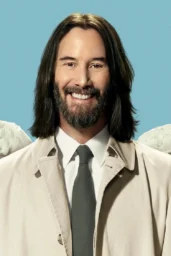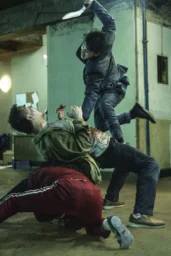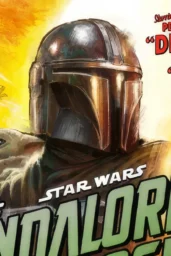What happens when a genius must choose between his heart and his armor?
Sixteen years have passed since Robert Downey Jr. first stepped into that cave in Afghanistan—and this ultimate Iron Man guide still captures the cultural earthquake that redefined superhero cinema: grounded. Human. Flawed. Brilliant.
But beneath all the repulsors and quips lies Marvel’s most intimate character study: a billionaire forced to confront the true cost of responsibility, and a genius discovering that his greatest invention might be his own undoing.
In this guide, you’ll meet the cast behind the masks, trace every evolution of Stark’s suits and weapons, and uncover the villains who pushed him to the brink. Strap in—if you want to understand the MCU, you start here.
- The Cast That Built an Empire
- Tony Stark / Iron Man (Robert Downey Jr.)
- Pepper Potts (Gwyneth Paltrow)
- James “Rhodey” Rhodes (Terrence Howard → Don Cheadle)
- The Supporting Universe
- Suits Evolution: More Than Metal
- Mark I: The Origin Story
- Mark II & III: Finding the Icon
- Mark IV–XLII: The Obsession Years
- J.A.R.V.I.S. → F.R.I.D.A.Y.: AI Evolution
- Arc Reactor: The Heart of the Matter
- Villains Who Mattered
- Obadiah Stane (Iron Monger): The Mentor’s Betrayal
- Ivan Vanko (Whiplash): Personal Vendetta
- Aldrich Killian & the Mandarin: Subverted Expectations
- The Narrative Arc That Started It All
- Iron Man (2008): Birth of a Hero
- Iron Man 2 (2010): Legacy Under Fire
- Iron Man 3 (2013): Deconstructing the Hero
- Cultural Impact: The Film That Changed Everything
- What Made It Work: The Stark Difference
- 5 Things That Define Iron Man’s Legacy
- Related Articles & Content Hub
- MCU Animation Guide: Complete Watch Order & Timeline
The Cast That Built an Empire
Tony Stark / Iron Man (Robert Downey Jr.)
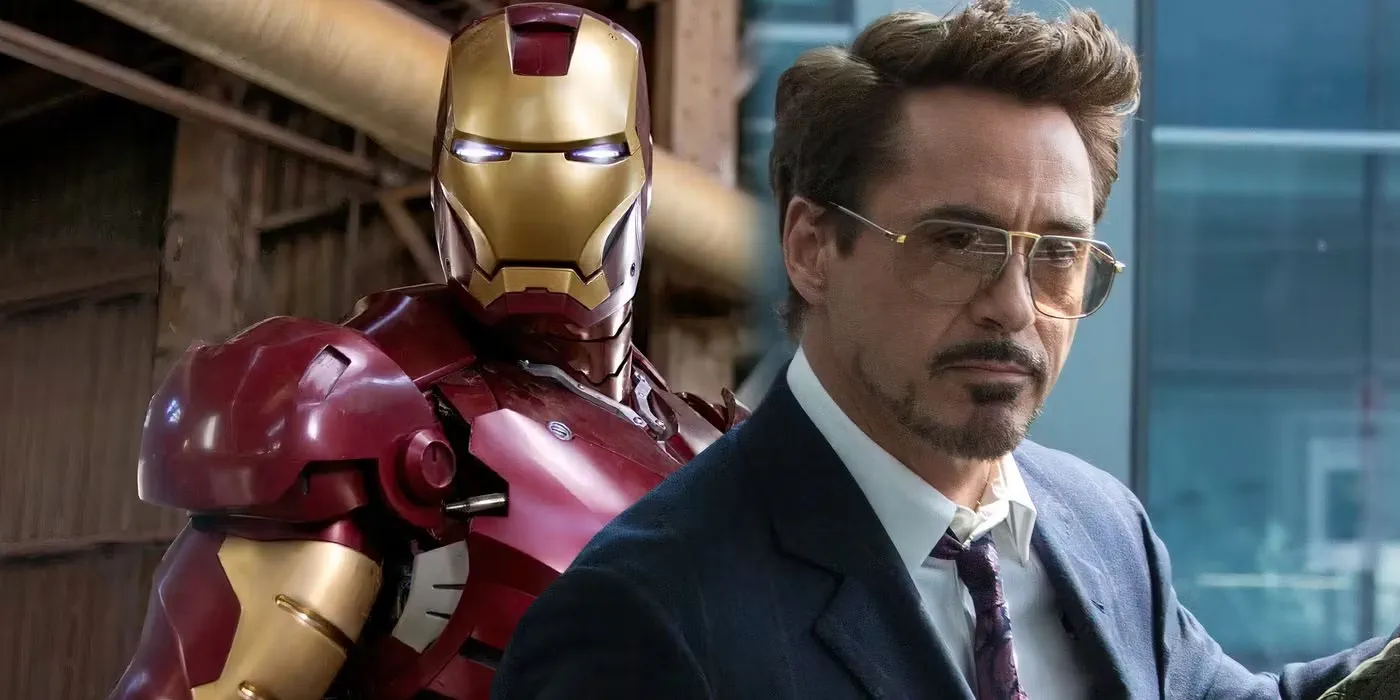
The casting of Robert Downey Jr. was either Marvel’s biggest gamble or most obvious choice—depending on who you ask. Fresh off personal struggles, RDJ brought a lived-in vulnerability to Stark that no script could manufacture.
Watch him in that first cave scene again. The way his hands shake while building the Mark I. That’s not acting—that’s an actor channeling his own resurrection story into a character who’s literally rebuilding himself from scrap metal.
“I am Iron Man.” Four words that changed everything. In 2008, superheroes still hid behind secret identities. Stark threw that playbook out the window during an off-script moment that became MCU gospel.
Pepper Potts (Gwyneth Paltrow)
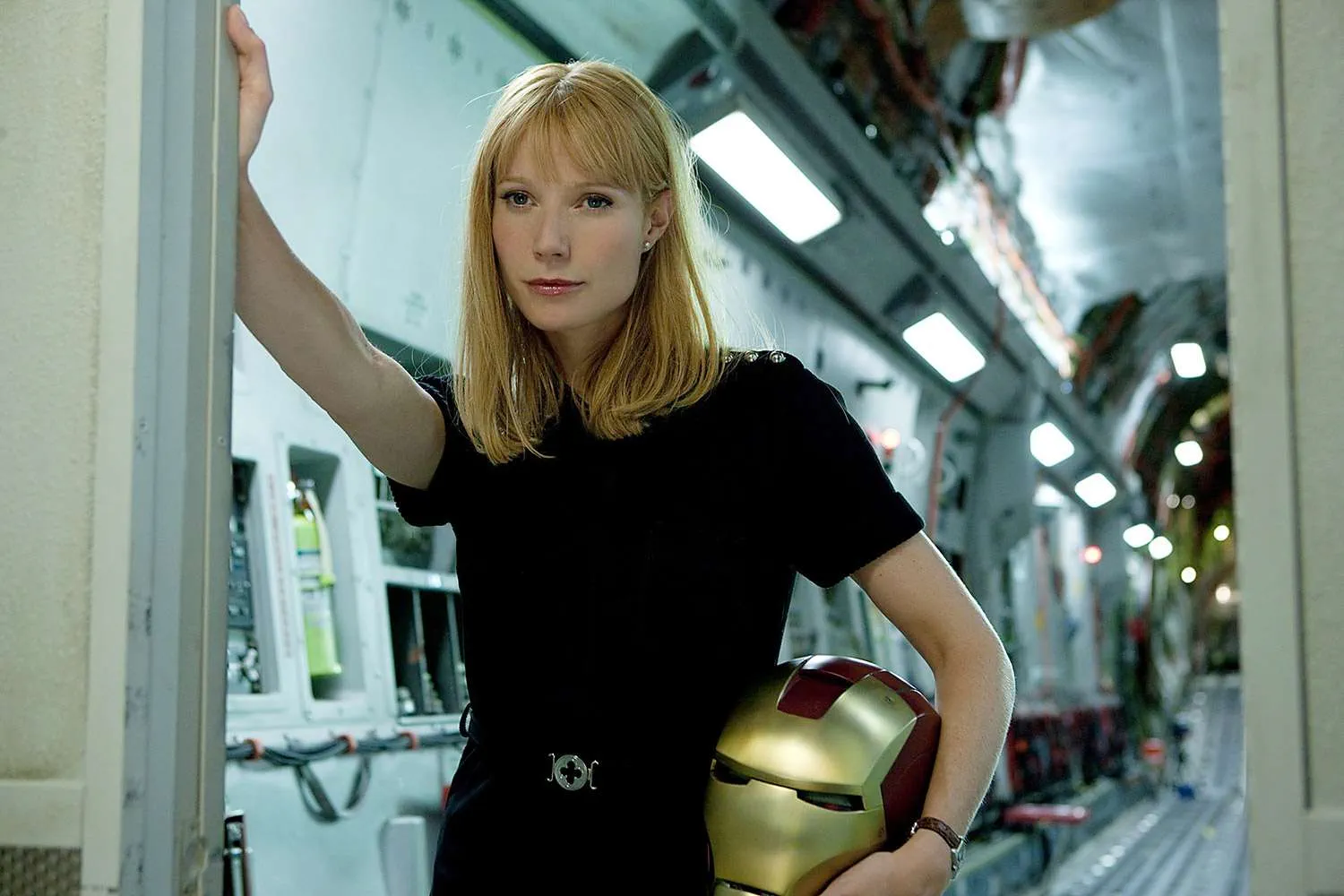
Paltrow’s Pepper anchored Stark’s emotional journey across three films. She’s not just the love interest—she’s his moral compass, his business partner, his reality check. The chemistry between Paltrow and RDJ crackles because it’s rooted in mutual respect, not just romantic tension.
Her evolution from secretary to CEO to Rescue mirrors Stark’s own growth. By Endgame, she’s literally suiting up alongside him. Talk about character development.
James “Rhodey” Rhodes (Terrence Howard → Don Cheadle)
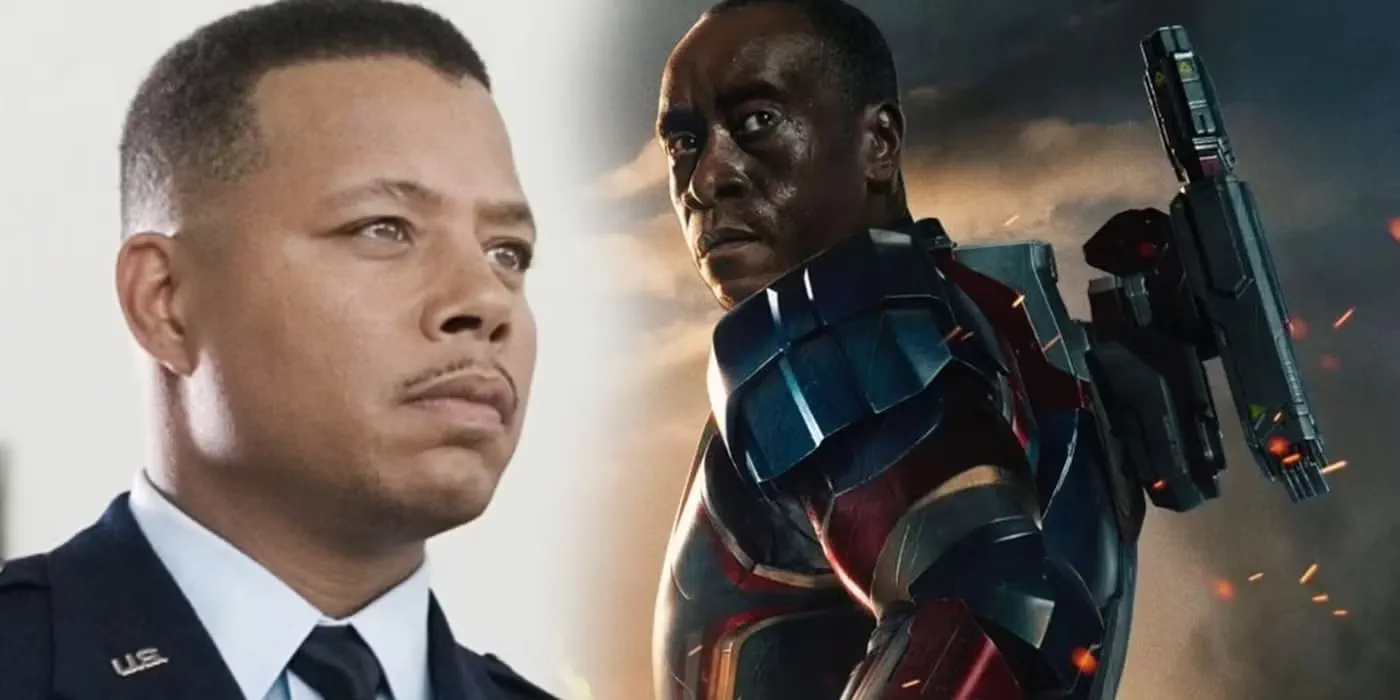
The recasting of Rhodey between Iron Man and Iron Man 2 remains one of Marvel’s most controversial decisions. Howard brought gravitas to the military friend role, but Cheadle transformed Rhodey into something more dynamic—a partner, not a sidekick.
War Machine’s introduction in the second film gave us our first taste of armored teamwork. Two suits, one friendship. It worked because Cheadle understood that Rhodey isn’t Tony’s yes-man—he’s his conscience in uniform.
The Supporting Universe
Nick Fury’s post-credits appearance in the original Iron Man wasn’t just a cameo—it was a promise. Samuel L. Jackson’s one scene launched a thousand theories and set the template for MCU world-building.
Happy Hogan (Jon Favreau) brought working-class loyalty to Stark’s ivory tower. Black Widow’s introduction in Iron Man 2 proved that this universe was bigger than one man in a metal suit.
Suits Evolution: More Than Metal
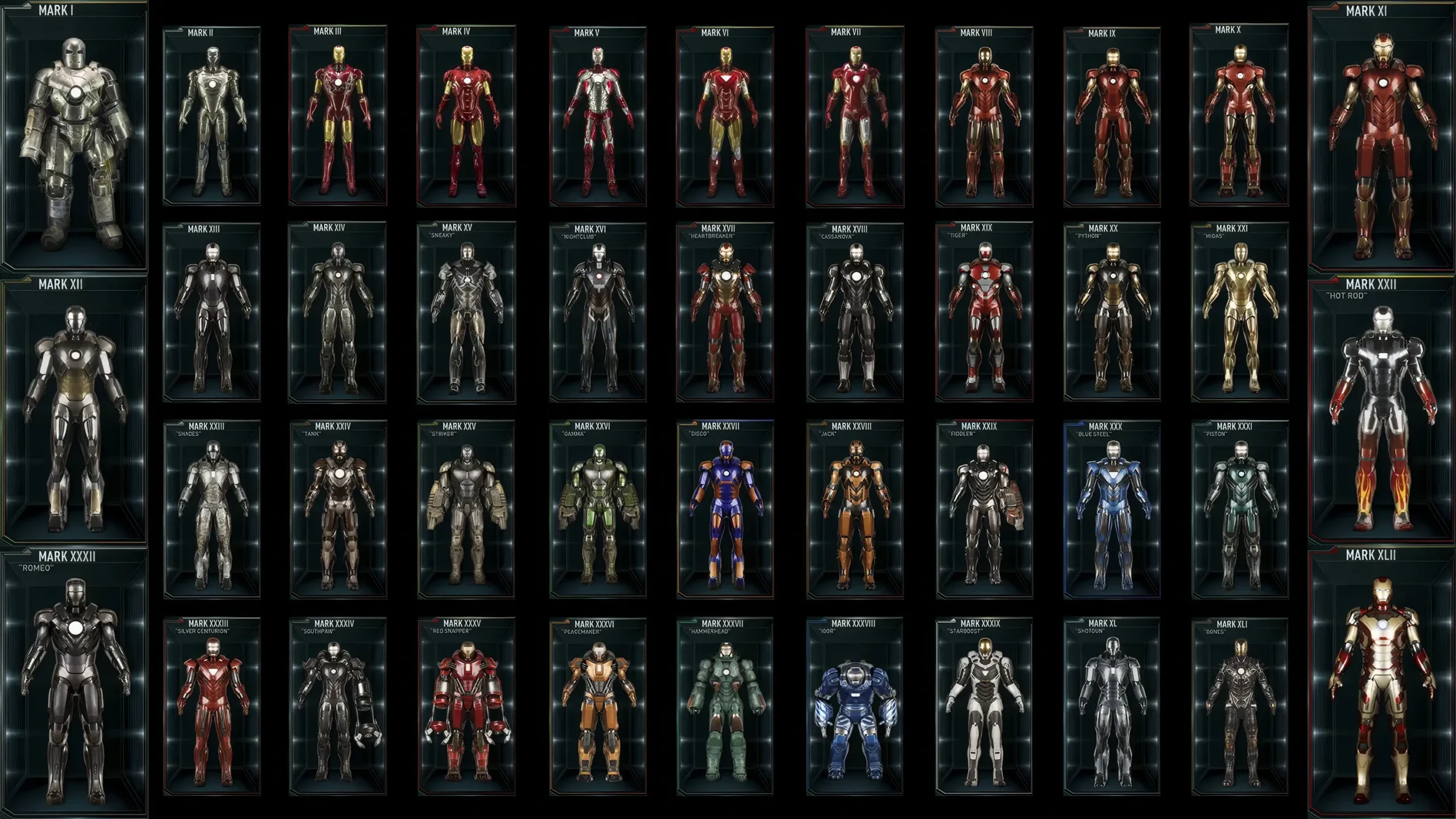
Mark I: The Origin Story
Built in a cave. With a box of scraps. The Mark I remains the most emotionally resonant armor in the entire MCU because it represents pure survival instinct transformed into heroic purpose.
That escape sequence—Stark walking through flames in his first suit—is still one of Marvel’s most powerful moments. It’s clunky, imperfect, dangerous. Just like the man inside it.
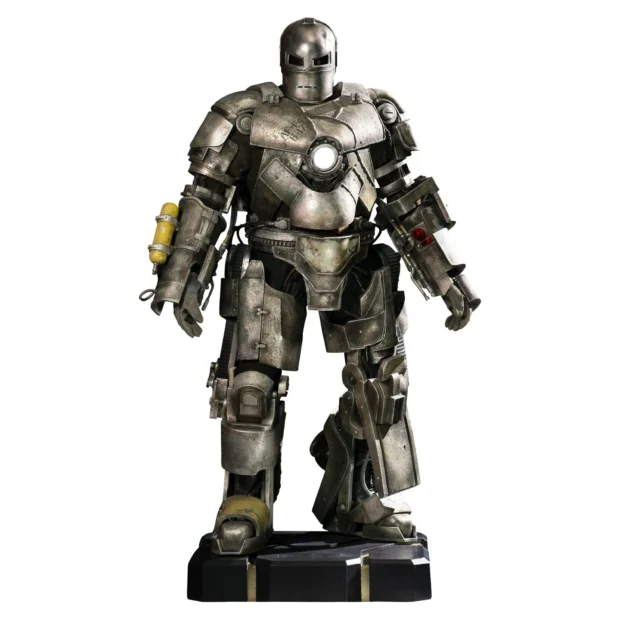
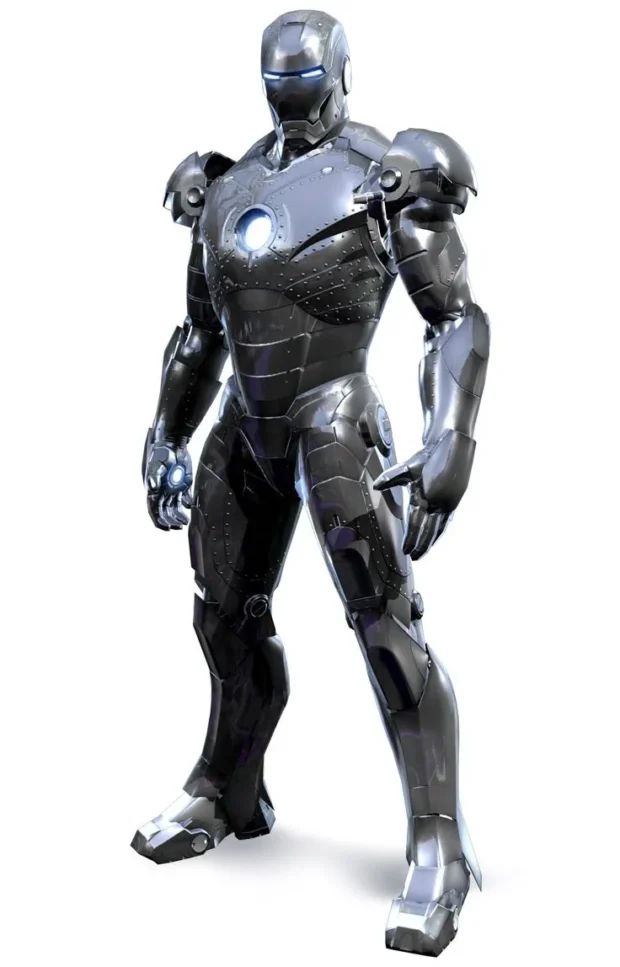
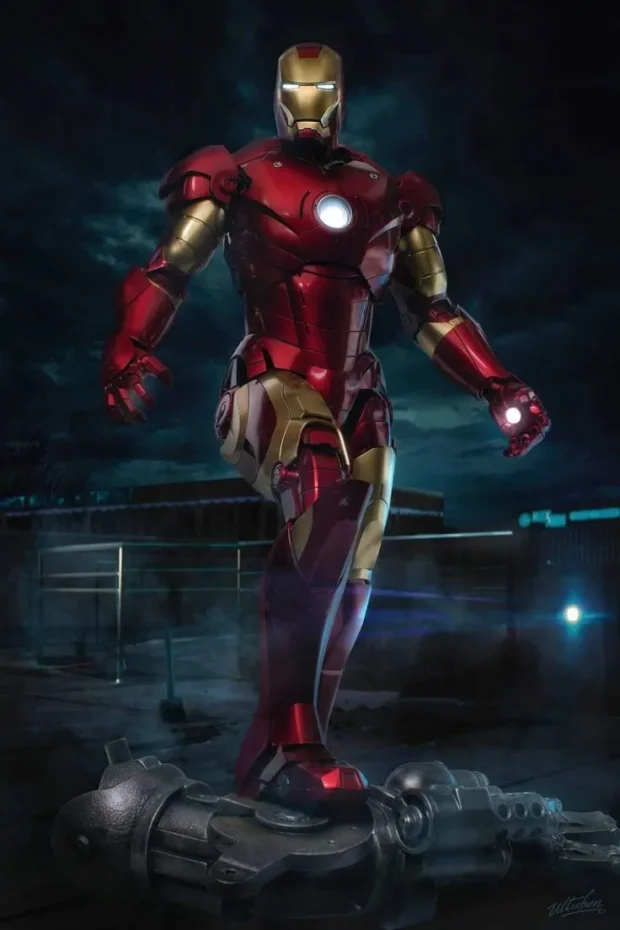
Mark II & III: Finding the Icon
The Mark II’s test flight sequence captures something essential about the Iron Man experience: the joy of flight, the terror of falling, the thrill of pushing boundaries. When RDJ crashes through his own mansion, you feel every impact.
The Mark III introduced the classic red-and-gold design that became synonymous with Iron Man. More than aesthetics, it represented Stark’s evolution from weapons dealer to world protector.
Mark IV–XLII: The Obsession Years
By Iron Man 3, Stark was building suits compulsively. The “House Party Protocol” revealed dozens of specialized armors—each one a reflection of his growing anxiety and PTSD.
The Mark XLII became his most personal suit, programmed to respond to his subconscious. It wasn’t just armor anymore—it was an extension of his fractured psyche.
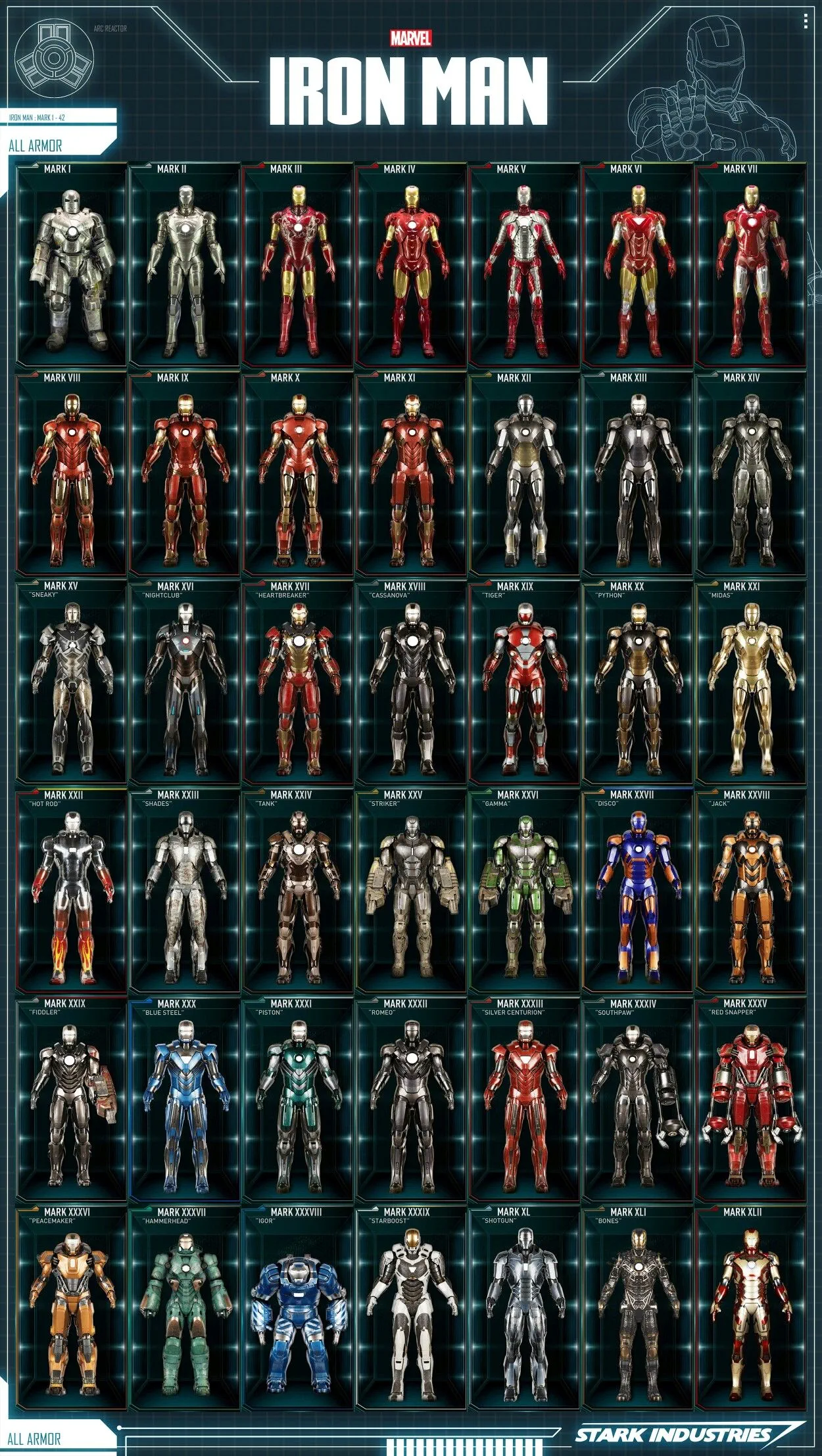
J.A.R.V.I.S. → F.R.I.D.A.Y.: AI Evolution
J.A.R.V.I.S. started as Stark’s digital butler and evolved into his closest confidant. Paul Bettany’s warm voice made artificial intelligence feel genuinely intelligent—and caring.
When J.A.R.V.I.S. became Vision, F.R.I.D.A.Y. stepped in with Kerry Condon’s more direct, less paternal approach. Different AI, different relationship dynamic, same emotional core.
Arc Reactor: The Heart of the Matter
More than a power source, the arc reactor became the trilogy’s central metaphor. In the first film, it literally keeps Stark alive. By the third, he’s ready to remove it—symbolically choosing to live without the thing that saved him.
“Proof that Tony Stark has a heart.” Pepper’s inscription on the original reactor tells you everything about this character’s journey.
Villains Who Mattered

Obadiah Stane (Iron Monger): The Mentor’s Betrayal
Jeff Bridges brought unexpected menace to Obadiah Stane, transforming a corporate villain into something genuinely threatening. The Iron Monger suit wasn’t just bigger than Stark’s—it represented everything wrong with Stark Industries’ past.
That final battle over the arc reactor facility? It’s really about two visions of power: Stane’s brute force versus Stark’s innovation. Guess which one wins.
Ivan Vanko (Whiplash): Personal Vendetta
Mickey Rourke’s Ivan Vanko remains the trilogy’s most controversial villain, but I’ve always appreciated his raw intensity. The Monaco Grand Prix attack—Vanko walking through explosions with his electric whips—is pure comic book cinema.
Vanko represents the road not taken for Stark. Another genius, another arc reactor, different choices. The son paying for his father’s sins.
Aldrich Killian & the Mandarin: Subverted Expectations
Iron Man 3’s villain twist remains divisive, but it’s also brilliant. The “real” Mandarin was never the threat—it was Stark’s own trauma, his inability to sleep, his compulsive armor-building.
Killian’s Extremis program turned people into weapons, literalizing what Stark feared most: that his technology would create monsters. Guy Pearce played him as a dark mirror of Stark’s own reinvention story.
The Narrative Arc That Started It All
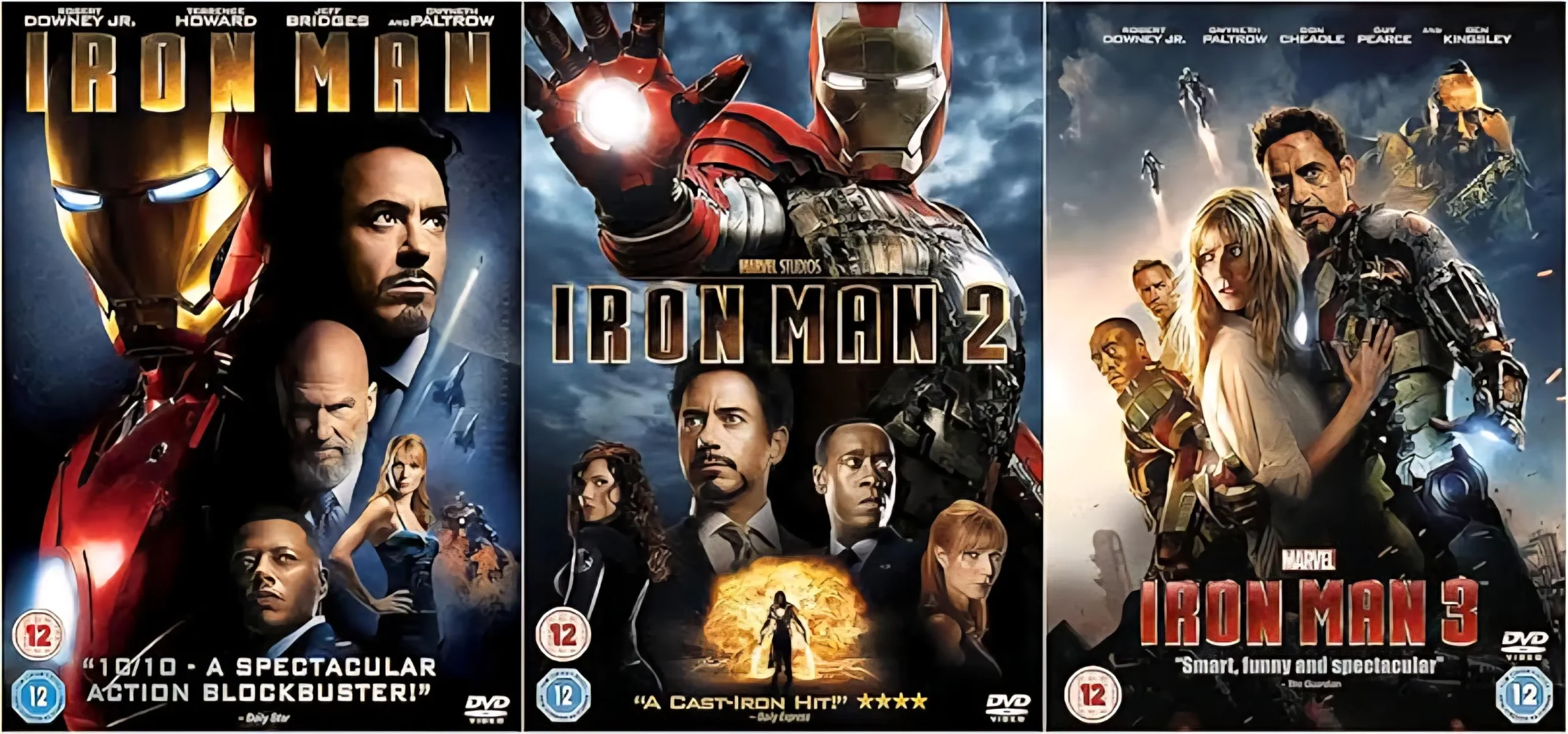
Iron Man (2008): Birth of a Hero
Jon Favreau’s original film works because it’s essentially a character study disguised as a superhero movie. The action serves the emotion, not the other way around.
That cave sequence remains the trilogy’s emotional core. Stark doesn’t become a hero because he gains power—he becomes a hero when he accepts responsibility for his power.
Iron Man 2 (2010): Legacy Under Fire
The sequel struggled under the weight of MCU world-building expectations, but at its heart, it’s about legacy. Howard Stark’s legacy to Tony. Tony’s legacy to the world. The poisonous arc reactor forcing him to confront his own mortality.
The drone army finale might be chaotic, but the emotional beats land: Stark choosing to trust Rhodey with armor, accepting his father’s love, embracing his role in something larger.
Iron Man 3 (2013): Deconstructing the Hero
Shane Black’s trilogy closer divided fans by stripping away everything that made Tony Stark seem invincible. No J.A.R.V.I.S. No working suits. Just a man with anxiety attacks and a box of hardware store supplies.
It’s the most human Iron Man film because it asks: who is Tony Stark without his armor? The answer: still a hero, just a more vulnerable one.
Cultural Impact: The Film That Changed Everything
Iron Man’s preservation in the U.S. National Film Registry speaks to its cultural significance beyond superhero cinema. It proved that comic book movies could be grounded, character-driven, and emotionally complex.
RDJ’s casting revolutionized the superhero archetype. No more square-jawed boy scouts—heroes could be flawed, funny, and fundamentally human. Every quip-heavy superhero since owes a debt to Stark’s wit.
The trilogy’s influence extends beyond Marvel. It established the template for shared universe storytelling that everyone from DC to Universal has tried to replicate. Those post-credits scenes weren’t just Easter eggs—they were promises of stories to come.
What Made It Work: The Stark Difference
Looking back, Iron Man succeeded because it never forgot that beneath the armor was a man worth caring about. The suits got more advanced, the villains more threatening, the stakes more cosmic—but the emotional core remained intimate.
Stark’s journey from weapons dealer to world protector to self-sacrificing hero resonates because it’s fundamentally about redemption. Not just for past mistakes, but for future possibilities.
The trilogy works as a complete arc: man builds armor, armor threatens to consume man, man learns to live without armor. It’s mythic storytelling wrapped in repulsors and wit.
5 Things That Define Iron Man’s Legacy
The Performance That Saved a Studio: RDJ’s casting was a calculated risk that paid off beyond anyone’s wildest projections. His natural charisma and personal journey perfectly aligned with Stark’s redemption arc.
Practical Effects Met Digital Innovation: The suit-up sequences still look incredible because they blended real props with cutting-edge CGI. You believe in the armor because the actors could touch it.
Villains Reflecting Inner Conflict: Each antagonist represented a different aspect of Stark’s psychology—his past mistakes (Stane), his guilt (Vanko), his trauma (Killian). The best superhero villains are mirrors.
Building a Universe One Scene at a Time: Those post-credits sequences weren’t accidents. They were carefully planted seeds that grew into the biggest film franchise in history.
The Arc Reactor as Metaphor: The glowing circle in Stark’s chest represented everything the character struggled with—dependence, mortality, the weight of keeping others alive through technology.
Sixteen years later, Iron Man’s impact on cinema feels both massive and intimate. It launched a universe while telling one man’s story. It combined cutting-edge effects with old-fashioned character development. It proved that superhero movies could be more than just spectacle—they could be personal.
And at the center of it all: a genius, billionaire, playboy, philanthropist who learned that the real superpower wasn’t the armor—it was the willingness to sacrifice everything for others.
The suit was just the delivery system. The heart was always the point.
What’s your favorite Iron Man moment? The cave escape? The first flight? “I am Iron Man”? Share your thoughts and let’s discuss what made this trilogy special in the comments below.
Source: Iron Man Wiki
Related Articles & Content Hub
MCU Animation Guide: Complete Watch Order & Timeline
Discover the ultimate MCU Animation Guide: your complete watch order and timeline for all Marvel animated projects…

